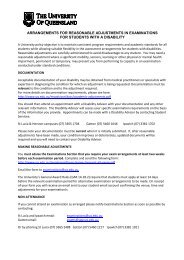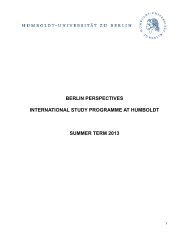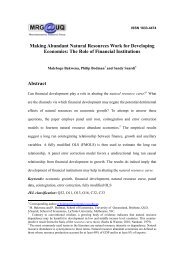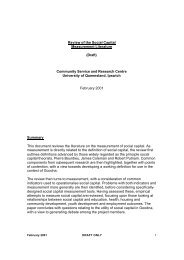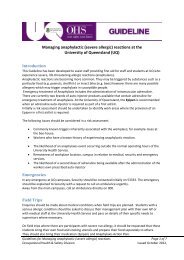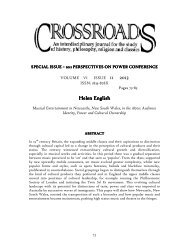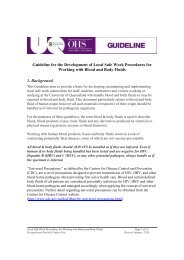Thinking, Willing and Judging - University of Queensland
Thinking, Willing and Judging - University of Queensland
Thinking, Willing and Judging - University of Queensland
Create successful ePaper yourself
Turn your PDF publications into a flip-book with our unique Google optimized e-Paper software.
SPECIAL ISSUE – MAX DEUTSCHERVOLUME 1V ISSUE 1 2009ISSN: 1833-878XPages 53-64Paul Formosa<strong>Thinking</strong>, <strong>Willing</strong> <strong>and</strong> <strong>Judging</strong>rABSTRACTIn this paper I examine Max Deutscher’s recent accounts <strong>of</strong> thinking, willing <strong>and</strong>judging, derived from his reading <strong>of</strong> Hannah Arendt’s The Life <strong>of</strong> the Mind, as set out inhis book Judgment After Arendt. Against Deutscher I argue that thinking does notpresuppose thoughtfulness, that being willing is compatible with willing reluctantly, <strong>and</strong>that actor <strong>and</strong> spectator judgments are distinct types <strong>of</strong> judgments.BIOGRAPHYPaul Formosa is currently a Research Fellow in Philosophy at Macquarie <strong>University</strong>,Australia. He received his PhD from the <strong>University</strong> <strong>of</strong> Queensl<strong>and</strong>. He has publishedwidely in journals such as: Journal <strong>of</strong> Value Inquiry, Kantian Review, Contemporary PoliticalTheory, Social Theory <strong>and</strong> Practice, Philosophical Forum, Philosophy <strong>and</strong> Social Criticism,Journal <strong>of</strong> Philosophical Research <strong>and</strong> Journal <strong>of</strong> Social Philosophy. His research interests are inmoral <strong>and</strong> political philosophy.53
THINKING, WILLING AND JUDGING‘To dismantle metaphysics requires me to take it in h<strong>and</strong>. Inevitably some sticks to my fingers.’ iBEING MINDFUL OF THE MINDIn this paper we shall enter into conversation with Max Deutscher’s most recent book, Judgment After Arendt.Deutscher’s book is an extended engagement with Hannah Arendt’s trilogy, The Life <strong>of</strong> the Mind, <strong>and</strong> its bookson thinking, willing <strong>and</strong> judging. ii While Deutscher’s book is based around a close <strong>and</strong>, at times, page by pagereading <strong>of</strong> Arendt’s book, his book is not, in the usual sense, a piece <strong>of</strong> Arendt scholarship. Deutscher only veryoccasionally engages, in any depth, with Arendt’s other texts or with the extensive secondary literature onArendt. iii This approach allows Deutscher to avoid getting mired in what have become the clichés <strong>of</strong> thatliterature, such as the alleged contradiction between Arendt’s two accounts <strong>of</strong> judgment, iv recast The Life <strong>of</strong> theMind as a work primarily in phenomenology rather than in political theory (as it is <strong>of</strong>ten read), <strong>and</strong> broaden thescope <strong>of</strong> his own project by extending the range <strong>of</strong> interlocutors who are brought into dialogue with Arendt’swork. vWhile Deutscher’s ‘ec-centric’ style <strong>of</strong> writing (‘[t]he hyphen disturbs the slur <strong>and</strong> reminds us <strong>of</strong> theinflexion’) vi is very different to Arendt’s, he nonetheless shares with her a similar method, a ‘historicallyinformed’ ‘post-metaphysics’ ‘influenced by phenomenology,’ vii a method that is at once ‘historical, fictional,poetic <strong>and</strong> analytical.’ viii This method, which is at home in our postmodern world ix <strong>and</strong> which draws freely <strong>and</strong>expertly upon both analytic <strong>and</strong> continental philosophical traditions, employs phenomenology to deconstructmetaphysics. Deutscher employs this method in Judgment After Arendt to investigate the life <strong>of</strong> the mind.In so doing Deutscher, following Arendt, examines the natural impulse we have to think about the mind indualistic <strong>and</strong> metaphysical terms. This impulse is not rejected as a sloppy inference. x Instead, thephenomenology <strong>of</strong> thinking that underwrites our impulse toward dualism is vindicated. When we think it reallyis as if we are no-where <strong>and</strong> no-when, as if we are lost in a world <strong>of</strong> thought, a world bound by laws <strong>of</strong> reasonrather than laws <strong>of</strong> causality. This is no mere fallacy or simple illusion, a ‘mirage that vanishes as weapproach.’ xi Someone who is thinking really is ‘somewhere else’; we talk to them, but they are utterly obliviousto what we say. They are lost in thought. ‘Hello!’ we cry, to call them back from wherever they have gone. xiiBut while Deutscher accepts that the experience or phenomenology <strong>of</strong> thinking, willing, <strong>and</strong> judgingunderwrites ‘impulses toward dualism,’ he rejects the ontological conclusions that the dualist draws. xiii Talk <strong>of</strong>being no-where <strong>and</strong> no-when when we think, or <strong>of</strong> an immaterial world <strong>of</strong> thought objects, is metaphorical talk.It is metaphorical talk because we cross directly over from one category to another by using terms at home insensation <strong>and</strong> observation, <strong>and</strong> apply these directly to another category, that <strong>of</strong> the mind. We speak <strong>of</strong> thinking,nous, as the mind’s eye. But we do not see things (invisible thought-things) with the mind like we see thingswith the eye. Rather it is the ‘relation between the eye <strong>and</strong> the object we see that can resemble the relationbetween nous <strong>and</strong> the object we think.’ xiv The brain is like the eye, but the mind, as the power <strong>of</strong> thinking,willing <strong>and</strong> judging that our brains make us capable <strong>of</strong>, is like the power <strong>of</strong> seeing that our eyes make us capable<strong>of</strong>. xv The mistake <strong>of</strong> dualism is to take our experience <strong>of</strong> the life <strong>of</strong> the mind, <strong>and</strong> the metaphorical language weuse to describe it, <strong>and</strong> reify those metaphors into hard ontological fact.In this way Deutscher reads Arendt, along with Gilbert Ryle (who was one <strong>of</strong> Deutscher’s Oxford teachers), xvias engaged in the project <strong>of</strong> underst<strong>and</strong>ing the mind in a way that avoids both dualism <strong>and</strong> reductivematerialism. This approach rejects the dualist’s claim that there are two worlds or two types <strong>of</strong> substance, onematerial <strong>and</strong> one immaterial. There is not a mind substance <strong>and</strong> a body substance, a Cartesian ghost in themachine to employ Ryle’s evocative phrase, xvii but rather a body that can think, will <strong>and</strong> judge; a ‘thinking,willing <strong>and</strong> judging body.’ xviii But this approach does not fall into reductive materialism. While, <strong>of</strong> course, the‘mind is the brain’ <strong>and</strong> ‘thinking is a brain process,’ only the dualist denies this, this identification doesn’t endthe story. xix This is because poking around in grey matter will tell us very little, by itself, about the life <strong>of</strong> themind, about thinking, willing <strong>and</strong> judging. As such, ‘it remains a conceptual <strong>and</strong> phenomenological business todescribe what brain processes make us capable <strong>of</strong>.’ xxWe are now in a position, having very briefly explored Deutscher’s general approach to the life <strong>of</strong> the mind, tocritically differ with the details <strong>of</strong> his Arendtian accounts <strong>of</strong> thinking, willing <strong>and</strong> judging. Such differing isessential to thinking. Indeed, plurality, differing from one another, is defining <strong>of</strong> the human condition as Arendtunderst<strong>and</strong>s it. But we can differ without parting company or, rather, we only keep each other (<strong>and</strong> ourselves)company by being different, by differing. In his generous reading <strong>of</strong> Arendt Deutscher writes: ‘A ‘flat’contradiction is stationary, the stultification <strong>of</strong> thought. In contrast, to be contradicted within thinking’s54
conversation is a critically friendly re-animation <strong>of</strong> the conversation.’ xxi It is in this spirit <strong>of</strong> keeping theconversation <strong>of</strong> thought running that we engage in this critique.THINKINGArendt’s investigation into thinking emerged, to a significant degree, out <strong>of</strong> her coverage <strong>of</strong> Adolf Eichmann’strial in Jerusalem. xxii After covering his trial Arendt came to the judgment that Eichmann was no monster. Hewas not driven by deep ideological hatred <strong>of</strong> Jews. Indeed the ‘only notable characteristic’ about him that shecould detect was something ‘entirely negative: it was not stupidity but thoughtlessness.’ xxiii Arendt explains:Clichés, stock phrases, adherence to conventional, st<strong>and</strong>ardized codes <strong>of</strong> expression <strong>and</strong> conduct havethe socially recognized function <strong>of</strong> protecting us against reality, that is, against the claim on our thinkingattention that all events <strong>and</strong> facts make by virtue <strong>of</strong> their existence. If we were responsive to this claimall the time, we would soon be exhausted; Eichmann differed from the rest <strong>of</strong> us only in that he clearlyknew no such claim at all. It was this absence <strong>of</strong> thinking – which is so ordinary an experience in oureveryday life … - that awakened my interest. xxivSuch an ‘absence <strong>of</strong> thought’ xxv is common enough. We are <strong>of</strong>ten too busy to stop <strong>and</strong> think, <strong>and</strong> sometimesthinking about what we are doing only gets in the way <strong>of</strong> doing it. But if the absence <strong>of</strong> thinking is such anordinary experience in our everyday lives, so too is the presence <strong>of</strong> thinking – or at least for most us, butseemingly not for Eichmann (‘he clearly knew no such claim at all’) on Arendt’s account. As such, Arendtmoves straight from the claim that Eichmann is to be characterised as thoughtless to the claim that he did notknow the experience <strong>of</strong> thinking. But this move is too quick since thoughtfulness <strong>and</strong> thinking are two differentthings. In contrast to Arendt, Deutscher is attentive to this distinction. But while he is attentive to thisdistinction, he ends up endorsing Arendt’s view that in the case <strong>of</strong> Eichmann we witness ‘the absence <strong>of</strong> acommon <strong>and</strong> ordinary thing [thinking].’ xxvi On this view thinking is a common <strong>and</strong> ordinary activity, somethingthat we all engage in all the time, that is, all <strong>of</strong> us except Eichmann (<strong>and</strong> perhaps some others).Deutscher adopts this solution since he argues that thinking presupposes thoughtfulness. Deutscher claims that:‘Thoughtfulness must frame any inner life that amounts to conversing with oneself.’ xxvii <strong>Thinking</strong> is the activity<strong>of</strong> conversing with oneself that occurs within a ‘thoughtful frame <strong>of</strong> mind’, where such a frame <strong>of</strong> mind isunderstood as a ‘readiness to think.’ xxviii This view, however, retains the problematic tension inherent inArendt’s account as it forces us, since thinking presupposes thoughtfulness, to move from the claim thatEichmann was thoughtless (a plausible claim) to the claim that he did not think (an implausible claim).However, the claim that a normal, sane (but thoughtless) adult human, as Eichmann was taken to be (‘Half adozen psychiatrists had certified him as ‘normal’’), xxix might never engage in the activity <strong>of</strong> thinking per se (inany sense <strong>of</strong> the term) will be shown to be implausible.What is the difference between thoughtfulness <strong>and</strong> thinking? Thoughtfulness refers to a way <strong>of</strong> being or doing;being thoughtful or doing something thoughtfully. To be thoughtful is to be mindful <strong>of</strong> who you are <strong>and</strong> whatyou are doing. It is to be aware <strong>of</strong> the significance <strong>and</strong> meaning <strong>of</strong> what you are doing while you are doing it.Thoughtfulness can refer to a character trait, that <strong>of</strong> being a thoughtful person, or more generally to a way,manner, or style <strong>of</strong> undertaking some activity or project, namely to undertake it thoughtfully. In contrast,thinking refers to a specific type <strong>of</strong> activity, a particular sort <strong>of</strong> doing - that <strong>of</strong> thinking. <strong>Thinking</strong> is a first orderactivity, something we do, just like running, swimming <strong>and</strong> reading are things that we do. Thoughtfulness is asecond order activity, a particular way <strong>of</strong> undertaking a first order activity. But we cannot undertake just anyactivity thoughtfully. Consider the case <strong>of</strong> a person throwing paper balls into a bucket to relieve boredom. Sucha person might be very focused on what he is doing. But we would not say that he is undertaking that activitythoughtfully, since it is an utterly mindless activity (as we say), not something that one can undertakethoughtfully. This is because there needs to be some significance or meaning to an activity in order to be able toundertake it thoughtfully.We can be thoughtful (<strong>and</strong> also thoughtless, that is, not thoughtful) about both what we are thinking <strong>and</strong> whatwe are doing. To think thoughtfully is not merely to think but to think about what you are thinking; to bemindful <strong>of</strong> the meaning <strong>and</strong> significance <strong>of</strong> your thoughts. To think thoughtlessly is not to be mindful <strong>of</strong> yourthoughts in this way. It is to just think, as when I just hit the ball. It is to just think about, for example, how toget from here to there, what a great holiday you had last year, which building is now the world’s tallest, <strong>and</strong> soon. To think thoughtfully is to have a thoughtful conversation with yourself by questioning <strong>and</strong> interrogatingyour own thoughts; it is to ask yourself why you want to go where you are going, why you thought it was such agreat holiday, what a holiday even is <strong>and</strong> how it differs from a journey, from travel, from work, <strong>and</strong> so on. Toact thoughtlessly is to just do what you are doing without reflecting on the significance or meaning <strong>of</strong> what you55
are doing, without in some cases even being particularly aware that you are doing it. For example, you arerunning through the forest <strong>and</strong>, after a while, you forget that you are even running. You aren’t aware <strong>of</strong> liftingyour feet, dodging the rocks, sucking in air, <strong>and</strong> so on. You might even begin to think about what you will havefor dinner while you are running, or start to think thoughtfully about a deep philosophical problem. Thus whileyou are undertaking one activity thoughtlessly, in this case running, you might be undertaking another activity,in this case thinking, thoughtfully. But it is hard to do more than one thing at a time thoughtfully.To see why, consider the example <strong>of</strong> a person who needs to walk through a crowd. He can walk through thecrowd thoughtlessly, bumping into others as he walks forward without really caring or even noticing, obliviousto where he is in relation to others, his mind focused elsewhere. Or he can walk through the crowd thoughtfully,trying to avoid bumping into others, aware <strong>of</strong> where he is <strong>and</strong> where others are <strong>and</strong> the way his bag swingsbehind him, ready to <strong>of</strong>fer an apology (which is genuine, not words uttered as a sort <strong>of</strong> reflex) whenever heinadvertently bumps into anyone. Being acutely aware <strong>of</strong> his surroundings, he stops spontaneously to help thewoman who drops her bag in front <strong>of</strong> him in the middle <strong>of</strong> the crowd (the thoughtless person barely even noticesthis). ‘How thoughtful,’ she exclaims as he h<strong>and</strong>s back her bag. But it is very hard to think thoughtfully whilealso walking through a crowd thoughtfully. If you are busy thinking deeply <strong>and</strong> thoughtfully about somedifficult metaphysical problem, then your mind is elsewhere. You are absentminded. Your mind is therefore toopreoccupied with its own thoughts to notice those around you. In this case to undertake one activity, that <strong>of</strong>thinking, thoughtfully, is to thereby undertake another activity, that <strong>of</strong> walking through the crowd, thoughtlessly,<strong>and</strong> vice versa.A thoughtful person is someone who judges well what needs to be thought about <strong>and</strong> when it needs to bethought about, as well as what needs to be undertaken thoughtfully, <strong>and</strong> what does not, <strong>and</strong> when it does <strong>and</strong>does not. This illustrates the double-edged nature <strong>of</strong> thinking. Both too much <strong>and</strong> too little thinking, or thinkingundertaken without judgment (at the wrong time, for example), has its dangers. xxx Too much thinking can makeus withdrawn <strong>and</strong> distant from the world so that we lose touch with it <strong>and</strong> become likely to bump into things <strong>and</strong>people, whereas too little thinking can fail to alert us to the moral significance <strong>of</strong> our actions. There is alsotension between thinking <strong>and</strong> thoughtfulness since being thoughtful about what we are doing, such as walkingthrough a crowd, can get in the way <strong>of</strong> thinking, <strong>and</strong> thinking can in turn get in the way <strong>of</strong> being thoughtfulabout other things. A thoughtful person judges well what to be thoughtful about <strong>and</strong> when to undertake aparticular activity, be it thinking or acting, thoughtfully.But while a thoughtful person (among other things) necessarily thinks, a person who thinks is not necessarily athoughtful person. A thoughtless person, someone who fails to think about what she is doing <strong>and</strong> the effects thiswill have on others, may still engage in the activity <strong>of</strong> thinking. Thus one can think without being thoughtful,that is, one can think in a way that is not thoughtful. Such thinking skims along the surface. It fails to unearth thesignificance <strong>of</strong> what one is thinking. But it is still thinking, even if it is not thoughtful thinking. In this sensethinking is an everyday activity, something we all do all the time, even though few <strong>of</strong> us are ideally thoughtfulpeople.We can (<strong>and</strong> do) think about all sorts <strong>of</strong> things <strong>and</strong> people, real <strong>and</strong> unreal, possible <strong>and</strong> impossible, aboutevents from the past or events that might happen or can never happen, about theories, concepts, words, stories,films, desires, dreams, <strong>and</strong> so on. This <strong>of</strong>ten takes the form <strong>of</strong> what we shall call ‘everyday thinking.’ xxxiEveryday thinking is a near relative <strong>of</strong> remembering <strong>and</strong> imagining. Indeed, as Deutscher notes, ‘to remember isto begin to think.’ xxxii To think in this sense is to withdraw from the world for a time to dwell uponsomething. xxxiii To dwell upon something is to concentrate <strong>and</strong> focus on it, to explicitly direct attention toward it,<strong>and</strong> not merely to daydream about it in an unfocused manner. In this sense we can think about something,especially when we stick to the surface <strong>of</strong> things, even if our frame <strong>of</strong> mind is not characterised bythoughtfulness. We can think without accompanying second order thoughtfulness about what we are thinking<strong>and</strong> why we are thinking it.In this sense it is undeniable that Eichmann sometimes, perhaps <strong>of</strong>ten, engaged in the activity <strong>of</strong> (at least‘everyday’) thinking. Eichmann sometimes, surely, thought about what he would do on the weekend, what hewould have for dinner, the day he was married or joined the S.S., his favourite book, how he could efficientlytransport Jews to death camps, <strong>and</strong> so on. Sometimes, no doubt, he dwelt in thought upon such issues, <strong>and</strong> hemay have even done so thoughtfully. What disturbs us is not that Eichmann did not think, but that he was notthoughtful about something <strong>of</strong> such immense moral importance as genocide. His thoughts about what he wasdoing stayed on the surface <strong>of</strong> things; how to organise this, who to contact to get that done, who to assign thispiece <strong>of</strong> work to, who to impress in order to gain promotion, <strong>and</strong> so on. He failed to be thoughtful about what he56
was doing in thinking such thoughts, about the meaning <strong>and</strong> significance <strong>of</strong> such actions for others <strong>and</strong> forhimself. This is immensely disturbing.How could he be like this? xxxiv A thoughtless person simply doesn’t give others a thought. Imagine the case <strong>of</strong> aschoolboy who sits on a seat at the front <strong>of</strong> the crowded bus while a frail elderly lady struggles to stay st<strong>and</strong>ingnext to him in the aisle. Such a schoolboy is being thoughtless, utterly oblivious to the impact his behaviour ishaving on others <strong>and</strong> the meaning <strong>and</strong> significance <strong>of</strong> what he is doing in occupying the seat while the elderlylady struggles to st<strong>and</strong>. (She could easily fall, break a hip, <strong>and</strong> never properly recover). In contrast, theschoolboy who is thinking with pleasure <strong>of</strong> the elderly lady struggling next to him is not thoughtless butmalicious. (Hitler, unlike Eichmann, was thus not thoughtless). But it is one thing to sit on a crowded busthoughtlessly, oblivious to others, <strong>and</strong> quite another to organise genocide while remaining largely oblivious tothe moral significance <strong>of</strong> one’s actions. That Eichmann could do so illustrates the shocking degree to whichthoughtlessness, as Arendt puts it, can shield us from all claims <strong>of</strong> reality.The case <strong>of</strong> Eichmann shows us that one can think, that one can (say) dwell upon how best to transport people todeath camps, without thinking thoughtfully about what one is doing in (<strong>and</strong> the significance <strong>and</strong> meaning <strong>of</strong>)thinking such thoughts. Thus, in an everyday sense <strong>of</strong> thinking, thinking does not presuppose thoughtfulness.However, there is another sense <strong>of</strong> thinking which does presuppose thoughtfulness. This is a philosophical (asopposed to everyday) sense <strong>of</strong> thinking, where this is understood as a thoughtful conversation between intimatefriends. One problem that emerges with both Arendt’s <strong>and</strong> Deutscher’s approach is that they try to forceeveryday thinking into a broader account <strong>of</strong> (philosophical) thinking, as conversation between friends, to whichit does not belong.Arendt, more so than Deutscher, comes to see thinking per se as a conversation whereby we actualise our innerplurality <strong>and</strong> split into a two-in-one, where we are both the one who asks questions <strong>and</strong> the one (or two) whoanswers them. To think in this sense is to have a conversation with ourselves, a sort <strong>of</strong> internal Socratic dialogueabout the meaning <strong>of</strong> something. This second order concern with the significance <strong>and</strong> meaning <strong>of</strong> what we arethinking is a clear sign <strong>of</strong> thoughtfulness. <strong>Thinking</strong>, in this sense, ‘unfreezes’ concepts by destabilising theirmeaning, as when Socrates unfreezes justice, piety or courage, or when Arendt (drawing on Heidegger)unfreezes the concept <strong>of</strong> a house. xxxv But just as not every flow <strong>of</strong> words counts as conversation, not everyjumble <strong>of</strong> words counts as thinking on this account. For inner dialogue to be thinking it must be a conversation,<strong>and</strong> a conversation is not mere ‘empty-headed chatter’. xxxvi <strong>Thinking</strong> is the activity <strong>of</strong> conversing with oneself orengaging in internal dialogue conducted ‘within a thoughtful frame <strong>of</strong> mind’, that is, within a frame <strong>of</strong> mindmarked by a ‘readiness to think.’ xxxvii Otherwise, on this account, it is not really thinking.Deutscher adds further nuance to this account by looking at the example <strong>of</strong> a painter ‘who thinks <strong>of</strong> which paintto put next, where, in what style’ <strong>and</strong> so on. Although the painter is not ‘making [internal] utterances’ aboutwhich paint to put where, Deutscher stretches the idea <strong>of</strong> a conversation without words to deal with this case.This is plausible since in this example the painter is considering the ‘pros <strong>and</strong> cons’ <strong>of</strong> ‘differing juxtapositions<strong>of</strong> colour,’ even though there is no explicit ‘private [verbal] muttering’ <strong>of</strong> those pros <strong>and</strong> cons in the way that awriter might ‘internally voice trial sentences.’ xxxviii Thus thinking is conversing with oneself within a thoughtfulframe <strong>of</strong> mind, where conversation is not ‘tied too tightly to the production <strong>of</strong> inner verbiage’. xxxixBut this concession isn’t enough since not all thinking can be construed as thoughtful conversation withourselves even when conversation is broadly understood. To illustrate this point we can reuse the earlierexample <strong>of</strong> someone thinking about the last holiday she went on. She is not debating with herself, even withoutwords, the pros <strong>and</strong> cons <strong>of</strong> her holiday, or meditating upon its meaning or significance. Rather she is savouringit, recalling it, dwelling upon it. She thinks about how pleasant it was to sit on the beach, feel the s<strong>and</strong> under herfeet, smell the ocean <strong>and</strong> hear the waves crashing down. Here ‘thinking’ is closer to remembering thanconversing; it is not thoughtful thinking, but it is thinking nonetheless. <strong>Thinking</strong> as the two-in-one <strong>of</strong> a pair <strong>of</strong>internal debating partners makes little sense <strong>of</strong> these sorts <strong>of</strong> cases. Of course, she might also start to think inthis way. She begins to think about what a holiday is, what counts as leisure, work <strong>and</strong> labour, how a holidaydiffers from a trip, a journey, travel, <strong>and</strong> so on. She starts to unfreeze concepts. But not all thinking is thoughtfulin this way.Further, even in this sense <strong>of</strong> thinking as the two-in-one <strong>of</strong> internal thoughtful conversation, it seems undeniablethat Eichmann sometimes undertook this activity. Surely he had internal conversations with himself about thepros <strong>and</strong> cons <strong>of</strong> certain proposed actions, not just about which tie to wear, but about weighty issues, such aswhether or not to sabotage Himmler’s orders when they become more ‘moderate’ by the fall <strong>of</strong> 1944, xl giventhat such orders seemed to Eichmann to be opposed to the will <strong>of</strong> the Führer, <strong>and</strong> the ‘Führer’s words had the57
force <strong>of</strong> law.’ xli Surely Eichmann thought about this, talked with himself about the pros <strong>and</strong> cons, <strong>and</strong> did sowithout flippancy but in a thoughtful manner, aware <strong>of</strong> the gravity <strong>of</strong> the situation. He even had to partlyunfreeze the concept <strong>of</strong> legality to determine the ‘criminality’ <strong>of</strong> Himmler’s illicit ‘moderation’ <strong>of</strong> the Führer’swill. xliiIt is too broad, then, to simply say that Eichmann lacked a ‘thoughtful frame <strong>of</strong> mind’ or a readiness to think. Hewas ready to think about many things, the sorts <strong>of</strong> things that we all think about (what we will have for dinner,our first love, what counts as ‘legality’, <strong>and</strong> so on), but his thinking remained trapped in unquestioned clichés,language rules, <strong>and</strong> conventionality (obey the will <strong>of</strong> the Führer!). Further, Eichmann was not ready to thinkabout the victims <strong>of</strong> his actions; that just made him ill. Eichmann speaks <strong>of</strong> feeling ‘physically weak’ <strong>and</strong> being‘upset’ by what he personally saw <strong>of</strong> the actual killing <strong>of</strong> Jews in Chelmno. ‘I hardly looked. I could not; I hadhad enough. The shrieking, <strong>and</strong> … I was much too upset.’ xliii Eichmann thinks here only <strong>of</strong> his own suffering (‘Ihad had enough’) in having to witness such scenes (poor Eichmann!), <strong>and</strong> not <strong>of</strong> the suffering <strong>and</strong> pain <strong>of</strong> thosebeing murdered before his eyes, partly as a result <strong>of</strong> his own actions. About all that he is utterly thoughtless.Clearly, then, Eichmann was not a thoughtful person. But he did think about some things, although usually notin a thoughtful manner, even though he did sometimes think in a (partly) thoughtful manner, as when he (partly)freed up the meaning <strong>of</strong> legality. But we need, however, to loosen up Arendt <strong>and</strong> Deutscher’s overly closeconceptual connection between thinking <strong>and</strong> thoughtfulness <strong>and</strong> reject the equation between thinking per se <strong>and</strong>the two-in-one <strong>of</strong> internal dialogue to take account <strong>of</strong> this complexity.WILLINGArendt’s account <strong>of</strong> willing traverses broad terrain, from Paul <strong>of</strong> Tarsus’ impotent will to Heidegger’s will-notto-will.But Arendt gives no clear resolution <strong>of</strong> the tensions that emerge in this investigation. While Arendtrejects Ryle’s claim that willing is a mere illusion, xliv she ends <strong>Willing</strong> in a mysterious ‘impasse’ which shepromises to overcome by an appeal to natality <strong>and</strong> another faculty ‘no less mysterious’, the faculty <strong>of</strong>judgment. xlv Perhaps this unresolved tension, given that tension is the dominant mood <strong>of</strong> willing, is simply howwilling necessarily appears to thinking?Given these problems, Deutscher makes significant <strong>and</strong> important progress in making sense <strong>of</strong> Arendt’s account<strong>of</strong> willing. Deutscher argues that:<strong>Willing</strong> is elusive. It is neither an action nor a telling <strong>of</strong> myself what I am to do … Considered as anactivity, willing is a superstition. (‘From the tarmac, I was willing the plane to l<strong>and</strong> safely.’) I interpret it,rather, as a mode – that <strong>of</strong> being willing. xlviUnlike thinking, willing is not an activity, an inner action that precedes <strong>and</strong> causes an outer action, but a mode<strong>of</strong> being, that <strong>of</strong> being willing to do what you are going to do, a state <strong>of</strong> willingly going-to-do something.Natality, the birth <strong>of</strong> a new person, becomes a metaphor for willing, for those actions whereby we set ourselvesfree from conformist behaviour by beginning something new <strong>and</strong> willingly setting about achieving our projects.<strong>Willing</strong>, then, is understood not as a noumenal interference ‘from above’ in the causal order <strong>of</strong> the world, but asa mode <strong>of</strong> being within that causal order.<strong>Willing</strong> is thus very different to thinking. I can think <strong>and</strong> think about doing something, but this never amounts toactually going to do it. Nor is willing simply desiring, wanting or wishing to do something. I might have alwaysdesired, wanted or wished to learn Russian, but never actually got around to doing it. I was never willing to doit. xlvii Further, I can be willing to do something even when I have no desire to do it. Deutscher gives the example<strong>of</strong> a man who is forced (someone he loves will be tortured if he doesn’t agree) by a criminal gang into beingwilling to drive a getaway vehicle for a bank robbery. He, knowing how much is at stake, becomes willing toco-operate. He drives the getaway car willingly, he doesn’t lag in his driving since a ‘failure <strong>of</strong> will might havebeen fatal,’ even though he has no desire to drive a getaway car in a bank robbery. xlviii Or we can switch theexample around, <strong>and</strong> imagine a timid man who has always desired to drive a getaway car in a bank robbery (hehas seen too many movies), but has never actually been willing to do so, never set about fulfilling that desire.These sorts <strong>of</strong> examples show us that willing is a mode <strong>of</strong> ‘being willing,’ a ‘directedness, a going-to-do’something. xlix In this sense the will is not some mysterious activity but something we ‘recognise … as a day-todayreality.’ lDeutscher uses this account to attack the idea <strong>of</strong> willing as a comm<strong>and</strong>er <strong>and</strong> slave relation, where we are boththe one who comm<strong>and</strong>s <strong>and</strong> the one who obeys, since such a divided will is marked by reluctance <strong>and</strong>antagonism, by a lack <strong>of</strong> being willing. If I obey only because I am comm<strong>and</strong>ed then I don’t act willingly. But58
this example also reveals a tension within Deutscher’s account. It is a tension that is present in the aboveexample <strong>of</strong> the getaway driver who is both willing <strong>and</strong> reluctant (unwilling?). Such a person seems to be, in onesense, comm<strong>and</strong>ing himself to act in a certain way, <strong>and</strong> in another sense, to be a slave who reluctantly carriesout the comm<strong>and</strong>s he is given. Is this a case <strong>of</strong> being willing to act in a certain way? Does being willing amountto going-to-do-something (as when we have a firm will to do what is right, even if we have to force ourselves todo this somewhat reluctantly) or going-to-do-something-willingly (so that we also want or desire to act as wehave set ourselves to act <strong>and</strong> thus undertake the act willingly, freely, without having to force ourselves)?Precisely these sorts <strong>of</strong> examples are central to Kant’s account <strong>of</strong> willing. Although Kant looms large inArendt’s accounts <strong>of</strong> thinking <strong>and</strong> judging, she simply ignores, or rather does not even seem to be aware <strong>of</strong>,Kant’s account <strong>of</strong> willing. li As such she misses Kant’s distinction between will (Wille) <strong>and</strong> power <strong>of</strong> choice(Willkür). lii While Wille is a matter <strong>of</strong> reason, Willkür is a matter <strong>of</strong> choice. Willkür is always free as it is neversimply determined by inclinations or reason but rather adopts intentions or maxims (what it is going-to-do)through the incorporation <strong>of</strong> either sensible or rational grounds. <strong>Willing</strong> is going-to-do something for a reason,<strong>and</strong> that reason can either be conditional on the presence <strong>of</strong> some contingent desire or interest, or it can becategorical <strong>and</strong> therefore based on the ends-in-themselves status <strong>of</strong> persons.In order to prove that pure reason can be practical, Kant considers examples where we set ourselves to dosomething unwillingly. liii He gives the example <strong>of</strong> a man who is ordered by a tyrant to commit perjury, therebycondemning another innocent man to death, but gaining financial reward in the process. liv If he refuses, he willbe badly tortured <strong>and</strong> executed. We can read Kant here as arguing that the consequences <strong>of</strong> refusing to perjureourselves are so horrible that no one would willingly undergo them. But even so, we can choose to do what isright by refusing to perjure ourselves. We can will to do so, to be in a state <strong>of</strong> going-to-do what is right, even ifthis must be done unwillingly.If this example carries any weight then it shows us that being in a state <strong>of</strong> going-to-do something, <strong>and</strong> beingwilling to do it (in the sense <strong>of</strong> willingness, the absence <strong>of</strong> reluctance or division), can come apart. Of course,Kant does not think that it is a good thing when they do come apart. But, given that our world is one wherehappiness is not distributed according to virtue, it will sometimes happen that what is right is something we areunwilling to do, as when morality (as in the case <strong>of</strong> the tyrant) requires a very great sacrifice <strong>of</strong> interest oropposes what we are very strongly inclined to do. We do not sacrifice these things willingly, but even so, we canwill to do so.However, Deutscher also writes that ‘the ‘comm<strong>and</strong>ing’ will as bringing order to quarrelling selves is no modelfor being willing. Rather, successful concurrence presupposes people who are willing to comm<strong>and</strong> <strong>and</strong> toobey.’ lv Drawing on this latter point he differentiates between ‘being repressed into obedience’ <strong>and</strong> ‘willing tobe lawful’ (a very Kantian sounding phrase). lvi If willing to be lawful, even when done unwillingly (in the sense<strong>of</strong> reluctantly), counts as an act <strong>of</strong> willing (as a case <strong>of</strong> being willing), then our discussion here serves to refinerather than contradict Deutscher’s account. But, against this rapprochement, Deutscher writes elsewhere: ‘A‘comm<strong>and</strong>ing’ will as the mind <strong>of</strong> one who is not yet willing is a faulty will – a function <strong>of</strong> a self or societydivided into antagonism against itself.’ lvii The point <strong>of</strong> Kant’s example, however, is that in some tough moralsituations internal antagonism is not something that can be avoided. Such internal division is a sign, not <strong>of</strong> afaulty will, but <strong>of</strong> a morally tough situation that requires a firm will.In such cases it is not our will that is conflicted or divided against itself, since our will is firm enough. Indeed, inKant’s theory there is no such thing as a divided will. Instead there are different reasons <strong>and</strong> different sorts <strong>of</strong>reasons (hypothetical <strong>and</strong> categorical reasons) vying for our attention. Reluctant willing can arise whenever allour reasons don’t point in the same direction. For example, if we had chosen to perjure ourselves the source <strong>of</strong>our reluctance to do so would have been countervailing moral reasons, <strong>and</strong> if we had chosen not to perjureourselves then the source <strong>of</strong> our reluctance would have been countervailing hypothetical reasons. In one casewill (Willkür) is at odds with our inclinations <strong>and</strong> in the other case it is at odds with our reason (Wille). In eithercase we are somehow at odds with ourselves, even though we have a firm will <strong>and</strong> are in a state <strong>of</strong> beingwilling.JUDGING<strong>Thinking</strong> is no great mystery, at least when compared to willing <strong>and</strong> judgment, which are more elusive. We saythat we are ‘lost in thought’ but never that we are ‘lost in willing or judgment’. This is because thinking is anactivity. We can point to specific times when we have been thinking. Indeed, as philosophers we sometimesspend whole days doing nothing but thinking. But we can’t point to specific moments when we are undertaking59
some mysterious activity <strong>of</strong> willing or judgment. We don’t devote whole days to willing or judgment. Even so,these are capacities <strong>of</strong> our minds <strong>and</strong> it is therefore a mistake to think them away.What then is judgment? Imagine that I have been appointed the judge <strong>of</strong> a competition. One afternoon I sit downto make a judgment. You ask me what I am doing, <strong>and</strong> I say, ‘Making a judgment’. But to say this is not to tellyou what ‘I am doing but what I am to do – what I shall have done when the work judgment requires iscomplete.’ lviii After having been willing to think long <strong>and</strong> hard about the various entries to the competition, theirrelative strengths <strong>and</strong> weaknesses <strong>and</strong> so on, I take the plunge, make a judgment, <strong>and</strong> declare that one <strong>of</strong> theentries is the winner. <strong>Thinking</strong> takes time, but willing <strong>and</strong> judgment occur in a flash. lix Even so, we must bewilling to judge thoughtfully.To say that judgment (unlike thinking) is not an activity <strong>and</strong> that it occurs (again, unlike thinking) in a flash, canbe misleading if we do not differentiate judging from judgment. <strong>Judging</strong> is a state <strong>of</strong> coming to a judgment,whereas to have judged is to have made a judgment. <strong>Judging</strong> is <strong>of</strong>ten accompanied or preceded by the activity <strong>of</strong>thinking, in particular by representative or enlarged thinking. This explains why, in her discussion <strong>of</strong> judgment,Arendt talks about an enlarged way <strong>of</strong> thinking which is ‘active in judging.’ lx To think in an enlarged way, or tothink representatively, is to think about the matter we are trying to reach judgment on from the perspective <strong>of</strong> acommunity <strong>of</strong> fellow judgers. Having undertaken such thinking we are <strong>of</strong>ten better placed to make a goodjudgment, the sort <strong>of</strong> judgment that we expect others to agree with. Judgment is thus a way <strong>of</strong> ‘sharing-theworld-with-others,’<strong>of</strong> seeing the world from the perspective <strong>of</strong> common sense (a sensing <strong>of</strong> the world that iscommon to all, a shared world) that transcends our five private senses, <strong>and</strong> is thus one <strong>of</strong> our ‘fundamentalabilities’ as political beings. lxi But thinking, even representative thinking, cannot take the place <strong>of</strong> judgment,since even after I have thought long <strong>and</strong> hard about a matter, I still have the work <strong>of</strong> judgment ahead <strong>of</strong> me.However, we don’t always have the time to stop <strong>and</strong> think before we judge; sometimes we must, while on therun, make a judgment straight away. But even in these cases judgment is never a matter <strong>of</strong> simply leaping to aconclusion. As Deutscher notes, the judge who declares his judgment as a result <strong>of</strong> sheer prejudice, rather thanas a result <strong>of</strong> weighing the evidence (however poorly), has not made a bad judgment but has failed to judge atall. lxii Such a judge pre-judges the case; he leaps straight to a conclusion rather than makes a judgment. To seewhy, consider another case. Deutscher gives the example <strong>of</strong> a runner who, ‘[h]aving no time to pause <strong>and</strong>consider,’ must ‘judge (‘on the run’) whether she can ‘clear an obstacle in a leap.’ lxiii While there is no time forthe runner to thoughtfully consider the matter, she must still judge. ‘To just leap would be to abdicate fromjudgment.’ lxiv The person <strong>of</strong> prejudice just leaps straight to a conclusion, <strong>and</strong> just leaping is not even judging onthe run. To judge is not to guess or blindly leap, but to bring our thought, knowledge, skills <strong>and</strong> experience tobear upon the matter. lxvDrawing on this account Deutscher attempts to deal with the much discussed problem <strong>of</strong> the actor-spectator splitin Arendt’s account (or accounts) <strong>of</strong> judgment. lxvi This problem seems to arise since Arendt develops twoaccounts <strong>of</strong> judgment, one from the perspective <strong>of</strong> the engaged actor who wants to work out what to do, <strong>and</strong>another from the perspective <strong>of</strong> the disengaged spectator who plays no part in the action at h<strong>and</strong> <strong>and</strong> who wantsto weave facts into a meaningful story. But it is not clear that these two accounts sit comfortably together. Therethus seems to be a schism between actor <strong>and</strong> spectator judgment which threatens to undermine the overallcoherency <strong>of</strong> Arendt’s account.We can see how Deutscher deals with this problem by drawing on the examples <strong>of</strong> judging on the run <strong>and</strong>judging a competition. In the first case the runner is in the thick <strong>of</strong> things <strong>and</strong> has no time to thoughtfullyconsider her options before she jumps. This looks like actor-judging. In the second case the competition judgehas plenty <strong>of</strong> time to thoughtfully consider the various entries (none <strong>of</strong> which belong to her) before she comes toa judgment. This looks like spectator-judging. On this point Deutscher writes:Arendt maintains, nevertheless, that we take up a temporary role as spectator when we go to will <strong>and</strong>judge. Her idea is that judging requires a use <strong>of</strong> the spectator’s point <strong>of</strong> view, not that judging is lockedinto it. Critics fail to recognise that her ‘spectator’ is only partially <strong>and</strong> temporarily separated from the[actor’s] playing field. lxviiThere is thus no rupture between the actor <strong>and</strong> the spectator. The runner is a partial <strong>and</strong> involved actor who,while on the run, taps into the spectator’s perspective in order to judge whether or not she can clear the obstaclein a single bound. Although some spectators may make more permanent <strong>and</strong> long-term departures from theactor’s playing field, they need not do so in order to be spectators. The same person might be judgingcompetitions one moment, like a spectator, <strong>and</strong> judging leaps the next, like an actor. Further, spectators are <strong>of</strong>tennot disinterested as they battle with others over the meaning <strong>of</strong> past events. But to the extent that such spectators60
are interested parties engaged in history wars they are also actors trying to make past events meaningful in aparticular way. Just as we can be spectators while playing on the actor’s field, we can also be actors whilesitting on the spectator’s bench.However, while Deutscher is right to reject any attempt to overplay the actor-spectator distinction, it is equallyimportant not to, as Deutscher risks doing, underplay it. Arendt highlights different features <strong>of</strong> actor <strong>and</strong>spectator judgments (these different features should be read as common, but hardly necessary or exclusive,characteristics). lxviii For Arendt, the actor (<strong>and</strong> here Arendt means specifically the political actor, a personworking out how to share the world with others) deliberates about what they will do <strong>and</strong> this makes them partial,interested, involved, concerned with gaining doxa or fame, <strong>and</strong> subject to the st<strong>and</strong>ards set by spectators. lxix Incontrast to the actor, the spectator (<strong>and</strong> here Arendt means specifically the historian, storyteller, novelist, poet,playwright, philosopher <strong>and</strong> so on) deliberates, not about what they are to do, but about the meaning <strong>of</strong> pastactions, <strong>and</strong> this makes them impartial, disinterested, uninvolved, concerned with conferring <strong>and</strong> not gainingfame, <strong>and</strong> the setters <strong>of</strong> the st<strong>and</strong>ards by which actors are to be judged. lxxFurther, actor <strong>and</strong> spectator judgments differ not only in the ways that Arendt highlights above, but also in terms<strong>of</strong> the different roles that Arendt sees them as playing. Actor-judgment has the role <strong>of</strong> doing the political heavylifting<strong>of</strong> justifying political values, principles <strong>and</strong> decisions. Spectator-judgment has the role <strong>of</strong> doing theexistential heavy-lifting <strong>of</strong> making our being in the world a meaningful <strong>and</strong> worthwhile activity. It is the actorwho, under the guidance <strong>of</strong> forward-looking judgment, performs meaningful actions <strong>and</strong> makes decisions aboutwhat to do. It is the spectator who, under the guidance <strong>of</strong> backward–looking judgment, makes those actionsmeaningful by making judgments about them, revealing their purpose <strong>and</strong> meaning, <strong>and</strong> thereby reconcilingboth actors <strong>and</strong> spectators alike to the way the world is. lxxi These two accounts are not in tension since they arenot even in competition. Each account simply reveals a different role for, or type <strong>of</strong>, judgment. One type <strong>of</strong>judgment is more forward-looking <strong>and</strong> the other more backward-looking. One type is more political, <strong>and</strong> theother is more existential, <strong>and</strong> so on. However, while Deutscher helps us to underst<strong>and</strong> the similarities betweenthese two types <strong>of</strong> judgments, we should not overlook the differences either.AFTER-THOUGHTSThe problem with a thoughtful book, such as Judgment After Arendt, is that it tends to raises more questionsthan it definitively answers. We have investigated some <strong>of</strong> these questions here. In particular, we havechallenged the claim that Eichmann did not think, even though he was a thoughtless person. With regard towilling, we examined the tension inherent in the idea <strong>of</strong> ‘being willing’, a tension that arises because this statecan be understood as going-to-do-something <strong>and</strong> going-to-do-it-willingly. We saw that in difficult moral casesthese can come apart. In such cases we need a firm will, even if this is accompanied by some reluctance. Finally,in regard to judgment, while following Deutscher’s lead in bringing actor <strong>and</strong> spectator judgment closertogether, we also cautioned against ignoring the differences between these two different types <strong>of</strong> judgments. Nodoubt there will be some problems with the arguments defended here. Further, there are also many importantissues that Deutscher examines in his rich book that we have not been able to think about here at all. And so theconversation, <strong>and</strong> the thinking, must go on <strong>and</strong> on.REFERENCESi Max Deutscher, Judgment after Arendt (Aldershot, Hampshire: Ashgate, 2007) xvi.ii The last book on judging, due to Arendt’s death, was never actually written, although we have some lecturesthat she delivered on judgment as well as material scattered throughout her published <strong>and</strong> unpublished writings.See, for example, Hannah Arendt, Between Past <strong>and</strong> Future: Eight Exercises in Political Thought (New York:Viking Press, 1968), Hannah Arendt, Eichmann in Jerusalem: A Report on the Banality <strong>of</strong> Evil (New York:Penguin Books, 1965), Hannah Arendt, The Human Condition (Chicago: The <strong>University</strong> <strong>of</strong> Chicago Press,1958), Hannah Arendt, Lectures on Kant's Political Philosophy, ed. Ronald Beiner (Brighton: The HarvesterPress, 1982).iiiA reviewer <strong>of</strong> Deutscher’s first book, Subjecting <strong>and</strong> Objecting, ungenerously calls this method one <strong>of</strong>‘ignoring the literature’ – see T S Champlin, "Review <strong>of</strong> Subjecting <strong>and</strong> Objecting by Max Deutscher,"Philosophy 60, No. 231 (1985): 140.iv See Ronald Beiner, "Hannah Arendt on <strong>Judging</strong>," in Lectures on Kant's Political Philosophy, ed. RonaldBeiner (Brighton: The Harvester Press, 1982).61
v Arendt <strong>and</strong> Gilbert Ryle, Donald Davidson <strong>and</strong> Sartre <strong>and</strong> Beauvoir, J.L Austin <strong>and</strong> Jane Austen, Wittgenstein<strong>and</strong> Heidegger, Merleau-Ponty <strong>and</strong> David Lewis, all take part in an amicable, if critical, conversation.vi Ibid. xi.vii Deutscher, Judgment after Arendt x. Interestingly, Deutscher attributes these same qualities to Gilbert Ryle’swork.viii Ibid. 39.ix Deutscher (p. 11) writes: ‘The postmodern condition is a syndrome, however wild the various ideas about itmay be. And postmodernism as a series <strong>of</strong> formulated opinions or lines <strong>of</strong> thought is not the invention <strong>of</strong>devilish devious philosophers such as Derrida, Baudrillard or Irigaray. Postmodern lines <strong>of</strong> thought expresschanges in culture - the intellectual <strong>and</strong> emotional weather.’ From Max Deutscher’s work in progress paper,Some Friendly Words for the Postmodern, presented at Blackheath Forum, 2 June 2007. Available online at:http://www.blackheathphilosophy.com.au/BlckhthRvisd2.pdfx See Deutscher, Judgment after Arendt 12.xi Ibid.xii Ibid. 51.xiii Ibid. xi.xiv Ibid. 47.xv See Ibid. xvi. Deutscher notes the Aristotelian origin <strong>of</strong> this idea. ‘She's [Arendt] got the common heritagethat she shares with Ryle particularly <strong>and</strong> Aristotle … [<strong>of</strong> underst<strong>and</strong>ing the mind in terms <strong>of</strong>] skills, capacities,being able to, potentialities.’ From the transcript <strong>of</strong> Max Deutscher’s interview with Allan Saunders, <strong>Thinking</strong><strong>and</strong> <strong>Judging</strong> with Hannah Arendt, broadcast on the ABC radio show The Philosopher’s Zone on 20 October2007. A transcript is available at:http://www.abc.net.au/rn/philosopherszone/stories/2007/2060510.htm. For Aristotle’s view see, for example,Aristotle, "De Anima," in The Basic Works <strong>of</strong> Aristotle, ed. Richard McKeon (New York: The Modern Library,2001), 413a, 14a.xvi Deutscher claims: ‘He [Ryle] was trying to say, We can look at this business <strong>of</strong> the mind without all thisreification, we can just look at how we talk <strong>and</strong> what we are trying to do with the kind <strong>of</strong> talk we have, aboutwhat people have found mysterious: thinking, imagining, even conversing <strong>and</strong> so on.’ Further, Deutscher claims‘…that what I've tried to do in the book [Judgment After Arendt] is a way <strong>of</strong> reworking Ryle too.’ From MaxDeutscher’s interview with Allan Saunders, The Great Divide, broadcast on the ABC radio show ThePhilosopher’s Zone on 13 October 2007. A transcript is available at:http://abc.com.au/rn/philosopherszone/stories/2007/ 2054463.htm. Some <strong>of</strong> these same issues are also exploredin Max Deutscher, "Simulacra, Enactment <strong>and</strong> Feeling," Philosophy 63, no. 246 (1988). The most relevant textby Ryle is: Gilbert Ryle, The Concept <strong>of</strong> the Mind (Chicago: The <strong>University</strong> <strong>of</strong> Chicago Press, 1949).xvii See Deutscher, Judgment after Arendt 72.xviii Ibid. xvii.xix Ibid. 73.xx Ibid. 74.xxi Ibid. 50.xxii See Arendt, Eichmann in Jerusalem: A Report on the Banality <strong>of</strong> Evil. I examine Arendt’s account in detailin Paul Formosa, "Is Radical Evil Banal? Is Banal Evil Radical?," Philosophy <strong>and</strong> Social Criticism 33, No. 6(2007), Paul Formosa, "Moral Responsibility for Banal Evil," Journal <strong>of</strong> Social Philosophy 37, No. 4 (2006).xxiii Hannah Arendt, The Life <strong>of</strong> the Mind: <strong>Thinking</strong>, ed. Mary McCarthy (London: Secker & Warburg, 1978) 4.Arendt makes the same point in her earlier work: ‘It was sheer thoughtlessness – something by no meansidentical with stupidity – that predisposed him to become one <strong>of</strong> the greatest criminals <strong>of</strong> that period’ - Arendt,Eichmann in Jerusalem 287-8. I will be assuming here that Arendt was indeed right in her analysis <strong>of</strong>Eichmann, but this claim is subject to challenge - see, for example, Yaacov Lozowick, "Malicious Clerks: TheNazi Security Police <strong>and</strong> the Banality <strong>of</strong> Evil," in Hannah Arendt in Jerusalem, ed. Steven E Aschheim(Berkeley: <strong>University</strong> <strong>of</strong> California Press, 2001).xxiv Arendt, The Life <strong>of</strong> the Mind: <strong>Thinking</strong> 4.xxv Ibid. 4-5.xxvi Deutscher, Judgment after Arendt 22.xxvii Ibid. 62.xxviii Ibid.xxix Arendt, Eichmann in Jerusalem 25-26.xxxFor Arendt this problem was illustrated by the ‘co-ordination’ <strong>of</strong> both the thoughtless many (such asEichmann) <strong>and</strong> the pr<strong>of</strong>essional thinkers (such as Heidegger) with the Nazi regime. See Hannah Arendt, Essaysin Underst<strong>and</strong>ing, ed. Jerome Kohn (New York: Schocken Books, 1994) 10.62
xxxi Here are some illustrative examples <strong>of</strong> everyday thinking from Deutscher’s book: ‘I catch myself thinkingabout the first house I owned’; ‘I am thinking about my car’; I ask ‘what holiday were you thinking <strong>of</strong>?’ – seeDeutscher, Judgment after Arendt 8, 58, 131.xxxii Ibid. 24.xxxiii See Ibid. 30.xxxiv Eichmann would have had a ‘bad conscience,’ have felt himself to be an ‘innerer Schweinehund’, only if hehad not done what he ‘had been ordered to do – to ship millions <strong>of</strong> men, women, <strong>and</strong> children to their death withgreat zeal <strong>and</strong> the most meticulous care’ - Arendt, Eichmann in Jerusalem 25.xxxv See Arendt, The Life <strong>of</strong> the Mind: <strong>Thinking</strong> 171, Deutscher, Judgment after Arendt 126.xxxviAlthough earlier Deutscher says that: ‘The thinking by which I keep myself company is ‘invisible’ –‘inaudible to others unless I speak my thought. Still, this ‘life <strong>of</strong> the mind’ is ‘never silent’. It is full <strong>of</strong> one’sincessant conversation – one’s chatter to oneself’ - Deutscher, Judgment after Arendt 23. This seems to allowthat even one’s chatter to oneself counts as a sort <strong>of</strong> thinking, although clearly not thoughtful thinking. We cancertainly keep ourselves company in this way.xxxvii Ibid. 62.xxxviii Ibid.xxxix Ibid.xlAs Arendt acidly remarks: ‘It was at this time that a ‘moderate wing’ <strong>of</strong> the S.S. came into existence,consisting <strong>of</strong> those who were stupid enough to believe that a murderer who could prove he had not killed asmany people as he could have killed would have a marvellous alibi’ - Arendt, Eichmann in Jerusalem 144-45.xli See Ibid. 148.xliiAs Arendt notes, Eichmann’s actions ‘showed a most unpleasant resemblance to that <strong>of</strong> the <strong>of</strong>ten-citedsolider who, acting in a normal legal framework, refuses to carry out orders that run counter to his ordinaryexperience <strong>of</strong> lawfulness <strong>and</strong> hence can be recognised by him as criminal’ - Ibid. 148-49. Eichmann recognised,not the Final Solution, but Himmler’s attempts to ‘moderate’ the Final Solution, as criminal on the grounds thatit would have contradicted Hitler’s will.xliii Here Eichmann performs the st<strong>and</strong>ard Nazi ‘trick.’ Instead <strong>of</strong> saying ‘What horrible things I did to people!’the murderers would say ‘What horrible things I had to watch in the pursuance <strong>of</strong> my duties, how heavily thetask weighed upon my shoulders!’ - Ibid. 87, 106.xliv Hannah Arendt, The Life <strong>of</strong> the Mind: <strong>Willing</strong>, ed. Mary McCarthy (London: Secker & Warburg, 1978) 4.xlv Ibid. 217.xlvi Deutscher, Judgment after Arendt xiv.xlvii Ibid. 92.xlviii Ibid.xlix Ibid.l Ibid.li Arendt claims that Kant simply reduces the will to practical reason <strong>and</strong> thus to thinking, <strong>and</strong> as such has noaccount <strong>of</strong> the will as a distinct faculty. She writes: ‘The only great thinker in these centuries who would betruly irrelevant to our context is Kant. His Will is not a special mental capability distinct from thinking, butpractical reason.’ See Arendt, The Life <strong>of</strong> the Mind: <strong>Willing</strong> 57, 149.lii For an excellent discussion <strong>of</strong> the distinction, see Henry E Allison, Kant's Theory <strong>of</strong> Freedom (Cambridge:Cambridge <strong>University</strong> Press, 1990). I also discuss Kant’s distinction in Paul Formosa, "Kant on the Radical Evil<strong>of</strong> Human Nature," The Philosophical Forum 38, No. 3 (2007).liii See my ‘Is Kant a moral constructivist or a moral realist?’, unpublished manuscript.liv See Immanuel Kant, "Critique <strong>of</strong> Practical Reason," in Practical Philosophy, ed. Mary J Gregor (Cambridge:Cambridge <strong>University</strong> Press, 1996), 5:30, Immanuel Kant, "Religion within the Boundaries <strong>of</strong> Mere Reason," inReligion <strong>and</strong> Rational Theology, ed. Allen Wood <strong>and</strong> George Di Giovanni (Cambridge: Cambridge <strong>University</strong>Press, 1996), 6:50.lv Deutscher, Judgment after Arendt 110.lvi Ibid. 111.lvii Ibid. 113.lviii Ibid. 134.lix Ibid. 133.lx Hannah Arendt, "Crisis in Culture: Its Social <strong>and</strong> Political Significance," in Between Past <strong>and</strong> Future: EightExercises in Political Thought (New York: Viking Press, 1968), 220.lxi Ibid., 221.lxii See Deutscher, Judgment after Arendt 156.lxiii Ibid. 134.lxiv Ibid. 135.63
lxv See the discussion <strong>of</strong> the role <strong>of</strong> rehearsal in this regard in Ibid. 134-36.lxvi See, for example, Beiner, "Hannah Arendt on <strong>Judging</strong>.", Ronald Beiner, "Rereading Hannah Arendt's KantLectures," Philosophy <strong>and</strong> Social Criticism 23, No. 1 (1997), Seyla Benhabib, The Reluctant Modernism <strong>of</strong>Hannah Arendt (Lanham: Rowman & Littlefield, 2003), Richard J Bernstein, "<strong>Judging</strong> - the Actor <strong>and</strong> theSpectator," in The Realm <strong>of</strong> Humanitas: Responses to the Writings <strong>of</strong> Hannah Arendt (New York: Lang, 1990),Kimberley Curtis, Our Sense <strong>of</strong> the Real: Aesthetic Experience <strong>and</strong> Arendtian Politics (Ithaca & London:Cornelll <strong>University</strong> Press, 1999), Linda M G Zerilli, "'We Feel Our Freedom': Imagination <strong>and</strong> Judgment in theThought <strong>of</strong> Hannah Arendt," Political Theory 33, No. 2 (2005).lxvii Deutscher, Judgment after Arendt 58.lxviii For Arendt’s discussion <strong>of</strong> the actor <strong>and</strong> spectator, see Arendt, Lectures on Kant's Political Philosophy 54-63. See also Arendt, "Crisis in Culture" 211-26, Arendt, The Human Condition 192, Arendt, The Life <strong>of</strong> theMind: <strong>Thinking</strong> 215-16.lxix See Arendt, Lectures on Kant's Political Philosophy 55.lxx These issues <strong>of</strong> detachment <strong>and</strong> involvement <strong>and</strong> their relation to objectivity are explored in Max Deutscher,Subjecting <strong>and</strong> Objecting: An Essay in Objectivity (St Lucia: <strong>University</strong> <strong>of</strong> Queensl<strong>and</strong> Press, 1983) 19-28.lxxi‘To the extent that the teller <strong>of</strong> factual truth is also a storyteller, he brings about that ‘reconciliation withreality’ which Hegel … understood as the ultimate goal <strong>of</strong> all philosophical thought … The political function <strong>of</strong>the storyteller – historian or novelist – is to teach acceptance <strong>of</strong> things as they are’ - Hannah Arendt, "Truth <strong>and</strong>Politics," in Between Past <strong>and</strong> Future 262. See also Hannah Arendt, "Underst<strong>and</strong>ing <strong>and</strong> Politics," in Essays inUnderst<strong>and</strong>ing, ed. Jerome Kohn (New York: Schocken Books, 1994), 308-9.64


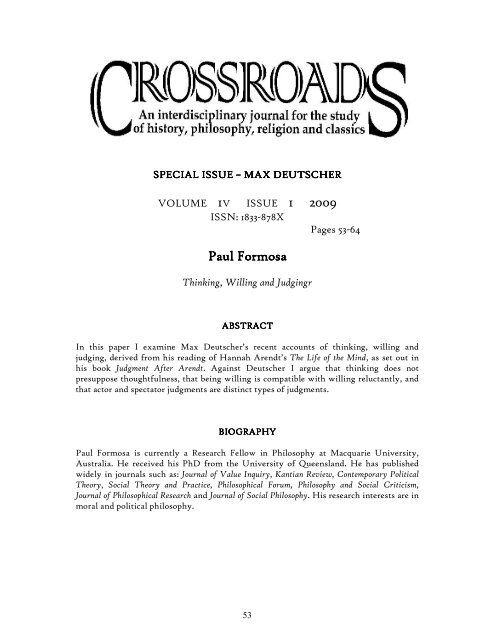
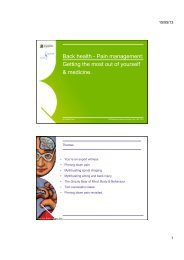
![Recycling [ PDF, 62KB ] - University of Queensland](https://img.yumpu.com/51805185/1/184x260/recycling-pdf-62kb-university-of-queensland.jpg?quality=85)
